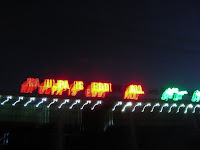 Newark (EWR) has a reputation for delayed flights, with one of the lowest on time departure ratings in the country. I've never been keen on it for that reason. Combine it with a flight on LOT, the Polish airline, and the receipe is one for frustration.
Newark (EWR) has a reputation for delayed flights, with one of the lowest on time departure ratings in the country. I've never been keen on it for that reason. Combine it with a flight on LOT, the Polish airline, and the receipe is one for frustration. LOT is not an organization for high levels of communication and service. No reason was given for the delay nor expected new time of departure and despite promises of making up the time in the air, we were as late arriving as we had been departing. Combine this with the fact that the video system on the plane was broken and the toilets ran out of paper of all kinds and you get the idea.
LOT is not an organization for high levels of communication and service. No reason was given for the delay nor expected new time of departure and despite promises of making up the time in the air, we were as late arriving as we had been departing. Combine this with the fact that the video system on the plane was broken and the toilets ran out of paper of all kinds and you get the idea. I had expected British Air to be better. However, due to the tremendous storms in London that weekend, our flight from Budapest to London was delayed on the runway for two hours in the 102 degree heat. The heat apparently short-circuted a warning system computer, which led to another 3 hours delay on the runway as they tried to fix it (which they eventually did by rebooting it....). Kudos to the captain for telling us all this, and thanks for the extra leg room, but 5 hours?
I had expected British Air to be better. However, due to the tremendous storms in London that weekend, our flight from Budapest to London was delayed on the runway for two hours in the 102 degree heat. The heat apparently short-circuted a warning system computer, which led to another 3 hours delay on the runway as they tried to fix it (which they eventually did by rebooting it....). Kudos to the captain for telling us all this, and thanks for the extra leg room, but 5 hours?Heathrow Airport (LHR) was a nightmare. A 4
 hour line to get rebooked and assigned a hotel room was followed by a 1 hour bus ride to Gatwick for a transfer. I eventually by-passed the Brits, called the US, booked both myself, and left the line. This built the British Empire?
hour line to get rebooked and assigned a hotel room was followed by a 1 hour bus ride to Gatwick for a transfer. I eventually by-passed the Brits, called the US, booked both myself, and left the line. This built the British Empire?I went to collect my luggage for the transfer and found the baggage hall filled with untidy piles of luggage. I was told both that there was no order to the mess and that new luggage was not being unloaded until tomorrow due to the pile up. Of course, they couldn't transfer my luggage to Gatwick for me.
Gatwick (LGW) saw more queues. British Air does not pre-assign seats, so it was 3 hours to check even without my luggage. I watched women with children fight for line positions as the British Air staff melted away. It was generally ugly.
 My luggage arrived several days later, just to be turned around for Salt Lake on a Delta flight delayed 3 hours departing from Raleigh (RDU) connecting with a Delta flight delayed 4 hours departing Cincinnati (CVG) for Salt Lake City (SLC).
My luggage arrived several days later, just to be turned around for Salt Lake on a Delta flight delayed 3 hours departing from Raleigh (RDU) connecting with a Delta flight delayed 4 hours departing Cincinnati (CVG) for Salt Lake City (SLC).Kam Air of Afghanistan is always a hit or miss proposition. I usually fly either Kam Air or Ariana Air from Dubai to get to Afghanistan. It doesn't much matter whether you are coming or going though; expect the times on your ticket to be meaningless. A few hours past departure, more or less, means little here. Manyana is the rule.
 Kam Air is better than Afghanistan's other airline though. Ariana Air flights often just suddenly don't exist any more. And Kam Air actully offers an in-flight movie. Its the same movie every time you fly, and there are no headphones so you have to strain to hear it coming from overhead speakers, but they have one. Interesting contrast to LOT and BA's broken systems.
Kam Air is better than Afghanistan's other airline though. Ariana Air flights often just suddenly don't exist any more. And Kam Air actully offers an in-flight movie. Its the same movie every time you fly, and there are no headphones so you have to strain to hear it coming from overhead speakers, but they have one. Interesting contrast to LOT and BA's broken systems. I can say that both Afghan airlines serve hot, real food both ways. That puts them one up on the US carriers. I en joyed my rice with roasted mystery-meat while watching Mr. Bean's Vacation in French for the second time. The joke by the Paris traffic police is much funnier in French, as is the waiter at the restaurant in the Gare de Lyon.
I can say that both Afghan airlines serve hot, real food both ways. That puts them one up on the US carriers. I en joyed my rice with roasted mystery-meat while watching Mr. Bean's Vacation in French for the second time. The joke by the Paris traffic police is much funnier in French, as is the waiter at the restaurant in the Gare de Lyon.Then there's Kabul International (KBL) airport. Slowely being improved, its security process continue to get more thorough every time I vist. That's good, since I could have gotten a sub-nose of any
 caliber onto the plane the first trip I took. However, efficiency has not improved. So now there are three stops in half-hour queues standing outside in the parking lot before you reach the front door, followed by another half hour at ticketing and customs. Then you get to wait and see what time the airlines might decide to lift off.
caliber onto the plane the first trip I took. However, efficiency has not improved. So now there are three stops in half-hour queues standing outside in the parking lot before you reach the front door, followed by another half hour at ticketing and customs. Then you get to wait and see what time the airlines might decide to lift off. Even Emirates sometimes fails spectacularly. My flight out of New York (JFK) left 2 hours late, but they still arrived in Dubai on time. That puts them one up on the Poles. However, I am now sitting in the lounge at Dubai Airport, Emirate's main hub, because my flight to Cairo has been delayed 5 hours. High marks for service and amenities, especially because I rate the business lounge with all my air miles (free food, Internet with unlimited wine!), but things break down fast when there's a problem.
Even Emirates sometimes fails spectacularly. My flight out of New York (JFK) left 2 hours late, but they still arrived in Dubai on time. That puts them one up on the Poles. However, I am now sitting in the lounge at Dubai Airport, Emirate's main hub, because my flight to Cairo has been delayed 5 hours. High marks for service and amenities, especially because I rate the business lounge with all my air miles (free food, Internet with unlimited wine!), but things break down fast when there's a problem.So hooray for the Hungarians on Malev;
 the only international airline flight to get it right in the last 60 days. Even Budapest Airport (BUD) was efficient and clean, complete with a Sbarro's. I thoroughly enjoyed my second visit to Budapest as well.
the only international airline flight to get it right in the last 60 days. Even Budapest Airport (BUD) was efficient and clean, complete with a Sbarro's. I thoroughly enjoyed my second visit to Budapest as well.My next stops are Berlin on Delta via JFK and Mexico City via some undetermined carrier and hub, probably Continental and Houston. We'll see how that goes....

























